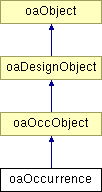 |
 |
 |
||||||
Inheritance diagram for oaOccurrence:

 |
Public Methods | |
| void | destroy () |
| oaBlock * | getBlock () const |
| oaModule * | getModule () const |
| oaOccInst * | getOccInst () const |
| void | getTermsByPosition (oaOccTermArray &array) const |
| oaOccurrence * | uniquify () |
| oaOccurrence * | uniquify (const oaScalarName &modName) |
| oaCollection< oaOccAssignment, oaOccurrence > | getAssignments () const |
| oaCollection< oaOccBusNetDef, oaOccurrence > | getBusNetDefs () const |
| oaCollection< oaOccBusTermDef, oaOccurrence > | getBusTermDefs () const |
| oaCollection< oaOccConnectDef, oaOccurrence > | getConnectDefs () const |
| oaCollection< oaOccModuleInstHeader, oaOccurrence > | getModuleInstHeaders () const |
| oaCollection< oaOccInst, oaOccurrence > | getInsts (oaUInt4 filterFlags=oacInstIterNotImplicit) const |
| oaCollection< oaOccInstTerm, oaOccurrence > | getInstTerms (oaUInt4 filterFlags=oacInstTermIterNotImplicit) const |
| oaCollection< oaOccNet, oaOccurrence > | getNets (oaUInt4 filterFlags=oacNetIterAll|oacNetIterNotImplicit) const |
| oaCollection< oaOccTerm, oaOccurrence > | getTerms (oaUInt4 filterFlags=oacTermIterAllNotHidden|oacTermIterNotImplicit) const |
| oaCollection< oaOccVectorInstDef, oaOccurrence > | getVectorInstDefs () const |
Public Types | |
| enum | { dtIndex = oacOccurrenceDataType } |
The oaOccurrence class represents an occurrence of an oaBlock and/or an oaModule in the occurrence hierarchy. An oaDesign may have zero or one top oaOccurrence. Except for a top occurrence, each oaOccurrence has a single oaOccInst that is its parent. An oaOccurrence also has zero or more occInsts that are its children.
Occurrences will only exist where the occurrence hierarchy has been expanded in the current session by starting at the top occurrence and calling oaOccInst::getMasterOccurrence(true). Occurrence objects will appear in the hierarchy representing all module objects that are instantiated under the top module and all block connectivity objects.
The oaOccurrence class can be observed by deriving from oaObserver<oaOccurrence>.
|
|
This function destroys this occurrence and the occurrence hierarchy below it, removing them from the database.
|
|
|
This function returns a collection of the assignments in this occurrence. |
|
|
This function returns the block that corresponds to (or contains) this occurrence. This will return NULL for an occurrence of a module that is not visible in the block domain. |
|
|
This function returns a collection of the busNetDefs in this occurrence. |
|
|
This function returns a collection of the busTermDefs in this occurrence. |
|
|
This function returns a collection of the connectDefs in this occurrence. |
|
|
This function returns a collection of instances in this occurrence. The filter flag bits are defined below and may be logically OR'd together to refine the contents of the collection.
|
|
|
This function returns a collection of the instTerms in this occurrence.
|
|
|
This function returns the module that corresponds to this occurrence. This will return NULL for an occurrence of a block that is not visible in the module domain. |
|
|
This function returns a collection of the moduleInstHeaders in this occurrence. |
|
|
This function returns a collection of nets in this occurrence. The filter flag bits are defined below:
|
|
|
This function returns the parent instance of this occurrence. Every occurrence has exactly one parent occInst, except the top occurrence which has no occInst. |
|
|
This function returns a collection of terms in this occurrence. The filter flag bits are defined below:
|
|
|
This function retrieves the terminals in this occurrence that have been assigned a position and returns them in the specified oaOccTermArray. A position in the array may be NULL to reflect that there is no terminal assigned to that position. The position of a terminal in the array reflects the position assigned to the terminal. |
|
|
This function returns a collection of the vectorInstDefs in this occurrence. |
|
|
This function ensures that this is the only occurrence of this module, creating a new module variant if necessary. This operation is applied recursively up the hierarchy, stopping when an occurrence that is already unique is reached. It explicitly does not uniquify occurrences in the hieararchy below the given occurrence. This version uses an explicitly specified name for the module. The uniquified occurrences refer to new modules, and existing module domain pointers are affected by this function. If you have module object pointers aquired before uniquify, you should reaquire the pointers by doing a find operation. Calling this function on the top oaOccurrence of an oaDesign, or on any other unique oaOccurrence, does nothing. Instead, call this function on an oaOccurrence of a non-unique oaModule, that is, an oaModule that is instantiated more than once.
|
|
|
This function ensures that this is the only occurrence of this module, creating a new module variant if necessary. This operation is applied recursively up the hierarchy, stopping when an occurrence that is already unique is reached. It explicitly does not uniquify occurrences in the hieararchy below the given occurrence. This version creates the module with an automatically generated name. The uniquified occurrences refer to new modules, and existing module domain pointers are affected by this function. If you have module object pointers aquired before uniquify, you should reaquire the pointers by doing a find operation. Calling this function on the top oaOccurrence of an oaDesign, or on any other unique oaOccurrence, does nothing. Instead, call this function on an oaOccurrence of a non-unique oaModule, that is, an oaModule that is instantiated more than once.
|
|
|
|

Copyright © 2002 - 2010 Cadence Design Systems, Inc.
All Rights Reserved.